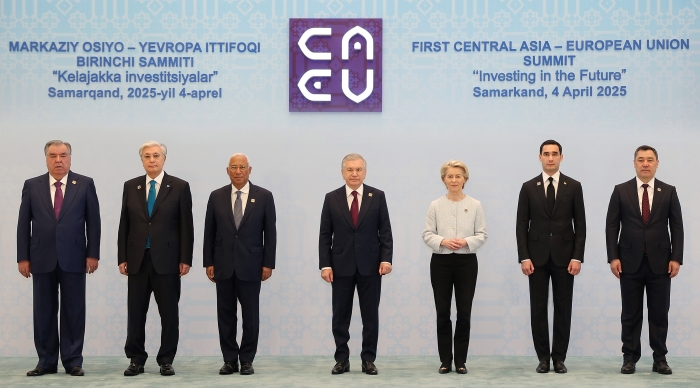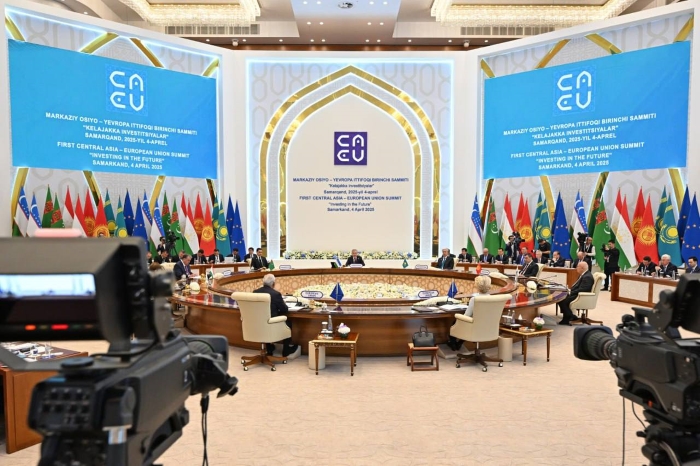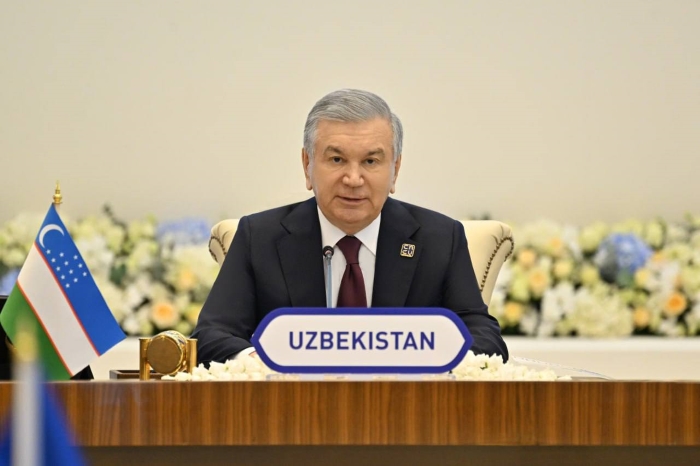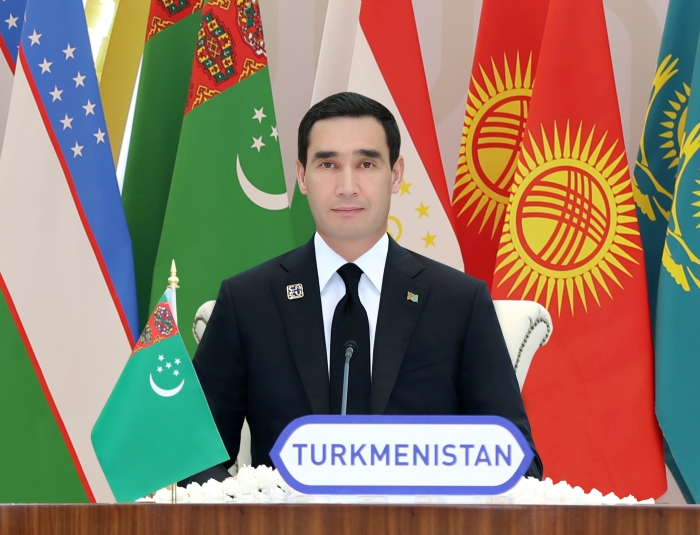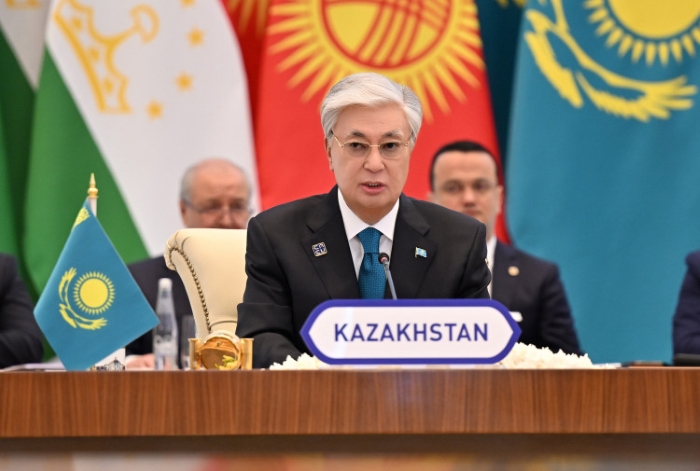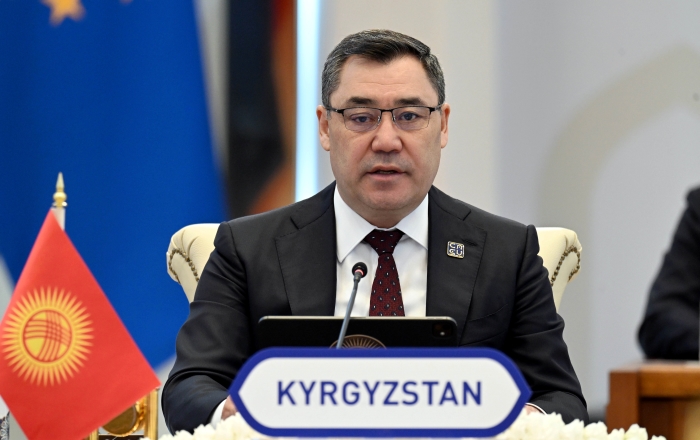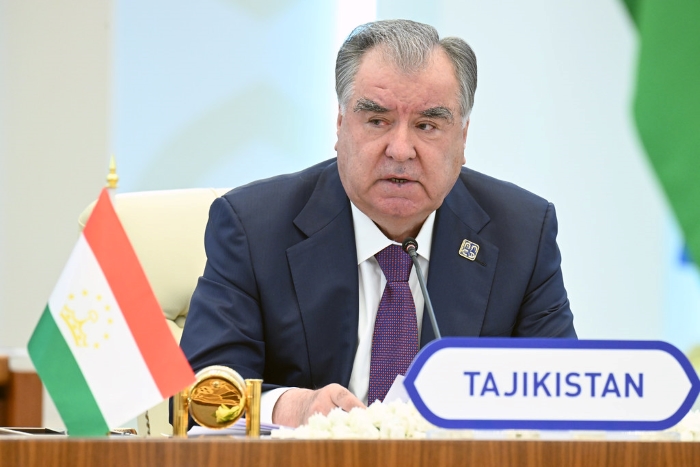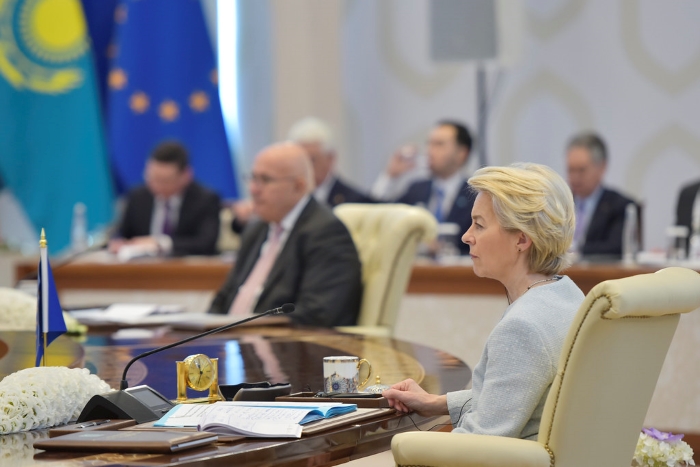On 4 April 2025, the first Central Asia-European Union summit was held in Samarkand under the chairmanship of Uzbekistan.
The summit was attended by:
• Uzbekistan – President Shavkat Mirziyoyev
• Kazakhstan – President Kassym-Jomart Tokayev
• Kyrgyzstan – President Sadyr Japarov
• Turkmenistan – President Serdar Berdimuhamedov
• Tajikistan – President Emomali Rahmon
• EU – President of the European Council António Costa and President of the European Commission Ursula von der Leyen.
• Odile Renaud-Basso, President of the European Bank for Reconstruction and Development
• The leadership of the European Investment Bank.
A joint press release published on the official website of the European Council and the Council of the European Union notes: “Against the backdrop of increasing high-level bilateral engagements over the past years and a rapidly evolving multilateral- and regional agenda, the EU and Central Asia leaders agreed to elevate relations between the two regions by establishing a strategic partnership.”
During the EU-Central Asia summit, leaders discussed joint efforts on strengthening sectoral cooperation, highlighting progress on economic, trade and investment ties, based on the implementation of current and future bilateral Enhanced Partnership and Cooperation Agreements (EPCAs).
They also supported ongoing efforts towards sustainable transport connectivity and strengthening economic ties through initiatives under the Global Gateway Strategy. In this context, leaders highlighted the progress on the Trans Caspian Transport Corridor connecting Europe and Central Asia.
The EU and Central Asia reaffirmed their commitment to strengthening sustainable transport connectivity as a driver of economic growth and regional integration.
The mobilization of EUR 10 billion in support and investments for Central Asia at the Global Gateway Investors’ Forum (January 2024) marks a pivotal step towards developing efficient regional transport corridors, logistics, networks, value chains and effective mechanisms to support mutual access to our respective markets.
The EU leaders reiterated their continuing support towards the accession of Uzbekistan and Turkmenistan to the World Trade Organisation (WTO).
To boost cooperation on energy and the green transition, the summit highlighted the shared EU and Central Asia commitment to sustainable value chains for critical raw materials, through the endorsement of the EU-Central Asia declaration of intent on critical raw materials.
Leaders also welcomed the increasing involvement of the European Investment Bank (EIB) and the European Bank for Reconstruction and Development (EBRD) in the region in the specific areas of energy, water management, connectivity, transport and critical raw materials.
Documents adopted
The press service of the President of Uzbekistan reported that following the first summit, a joint declaration was adopted providing for the establishment of a strategic partnership between the two regions and a declaration on cooperation in the field of critical minerals.
The Joint Declaration adopted at the end of the first EU-Central Asia Summit has been published on the official websites of the European Council and the Council of the EU, as well as the European Commission:
https://ec.europa.eu/commission/presscorner/detail/fr/statement_25_980
A 12 billion Euro worth investment package
The European Union has launched a 12 billion Euro investment package for Central Asia as part of Global Gateway investment program, according to a press statement by the President of the European Commission, Ursula von der Leyen, following the summit.
The Pact has four priorities:
1. Transport with the flagship project of the Trans-Caspian Transport Corridor;
2. Climate, energy and water (Rogun and Kambarata dam projects, green belt in the Aral Sea basin);
3. Digital technologies.
4.Critical raw materials of Central Asia, much needed by the European Union (creation of local value chains for the critical minerals in Central Asia).
Uzbekistan puts forward initiatives to strengthen economic cooperation between Central Asia and the European Union
“There is a noticeable intensification of cooperation between the region and the European Union. Over the past seven years, the trade turnover between the two countries has grown several times, amounting to 54 billion Euro,” President of Uzbekistan Shavkat Mirziyoyev said.
In order to further develop cooperation in the medium and long term, Mirziyoyev suggested considering signing a full-fledged Partnership and Cooperation Agreement between the two regions.
He identified investments in economic and technological modernization as a priority for cooperation. “In early June, in partnership with the European Bank for Reconstruction and Development, we will hold the Tashkent Investment Forum. At this event, we intend to present the current portfolio of projects with leading European companies and banks worth over 30 billion Euro,” Mirziyoyev said.
According to the head of Uzbekistan, the opening of the office of the European Investment Bank in Tashkent will stimulate the inflow of direct investments to Central Asia from the EU countries.
He also voiced the initiative to launch an investment Platform to promote major regional projects in the field of green energy, innovation, transport, infrastructure and the agricultural sector.
In addition, it was proposed to conclude a multilateral agreement on the protection and promotion of investments; launch a joint Chamber of Commerce “Central Asia – EU”; adopt regional programs to support projects of small and medium-sized businesses, women’s entrepreneurship.
Uzbekistan considers deepening cooperation and investments in the field of critical mineral resources to be another promising area for mutually beneficial partnership. However, as Mirziyoyev noted, the main obstacle to the delivery of these products, as well as finished industrial and agricultural goods to the European market, is the lack of effective transport corridors. He called for coordinated measures and for creating favorable conditions for the expansion of the Trans-Caspian Transport Corridor.
Speech by President of Turkmenistan Serdar Berdimuhamedov at the first Central Asia–European Union Summit
Dear President of the Republic of Uzbekistan, Dear Heads of Central Asian States,
Dear leaders of the European Union, Ladies and gentlemen, members of the delegations!
First of all, let me warmly welcome you and express my gratitude to the President of the Republic of Uzbekistan, dear Shavkat Miromonovich Mirziyoyev, for his cordiality, hospitality and the created working conditions.
Today’s meeting is of particular importance, as it is the first time that the Central Asian countries and the European Union are holding talks in such a format at the highest level. That in itself is a significant event. In our opinion, this indicates that all participants understand the need to deepen relations, strive for rapprochement and build strong partnership mechanisms.
We hope that the upcoming discussions will mark an important stage in strengthening our ties, reaching mutual understanding, and reaching concrete agreements.
Dear participants!
Turkmenistan highlights the achievement and maintenance of regional peace, security and stability among the most important tasks of joint work. We believe that in the current circumstances, political and diplomatic cooperation between the Central Asian countries and the European Union can have a noticeable constructive impact on the overall situation in the region and neighboring countries, and contribute to the efforts of the international community in this direction, primarily through the United Nations.
We proceed from the common intention to see Central Asia as a peaceful, economically attractive region, a territory of stability and predictability, not embroiled in geopolitical conflicts and contradictions.
Turkmenistan is ready to work towards achieving these goals in accordance with its neutral status and international commitments. In this context, I would like to draw attention to the Resolution “Permanent Neutrality of Turkmenistan”, which was unanimously adopted on 21 March by the UN General Assembly, which was co-sponsored by 67 states. I would like to take this opportunity to express my great appreciation for the support of the document.
The settlement in Afghanistan is the most important issue for peace and security in the regional and global dimensions.
Dear participants!
We highly appreciate the potential for cooperation between Central Asia and the European Union in the economy and investment, energy, transport, and trade, and we consider these areas to be priorities.
Turkmenistan is firmly committed to a serious energy dialogue with the EU on a new substantive level and is ready to implement practical steps.
We advocate the launch of practical joint projects in the field of “green” energy. For example, Turkmenistan is increasing its electricity production capacity and is ready to supply it to Europe. With the consolidated position of the states through whose territory the power transmission line will pass, I am confident that this project can be implemented in the near future and on a mutually beneficial basis.
We are also ready to work with European partners on the use of wind and solar energy. In addition, we are open to considering the prospects of cooperation in the field of hydrogen energy.
The strategic direction is transport and communications. Its key component is the creation of the East–West and West–East transport and communication lines. We assign the most important role here to the Trans-Caspian route. We are ready to provide the facilities of the Turkmenbashi International Seaport on the Caspian coast of Turkmenistan, as well as the road infrastructure in our country in the interests of this project.
In the field of communications, we also proceed from the necessity and possibility of laying cables along the bottom of the Caspian Sea. Turkmenistan generally believes that the construction of underwater infrastructure in the Caspian meets the economic needs of coastal countries and is an important condition for ensuring energy, economic and transport stability in Eurasia based on equal consideration of interests and benefits.
In general, we are convinced that the effective investment participation of the European Union in a complex of infrastructure projects in the region would be a very timely step.
We are open to a significant expansion of trade with Europe, we are ready to provide investors with the most favorable conditions, and we invite companies to establish their presence in the Turkmen market. To do this, we suggest that the European Union consider the possibility of creating programs to support exporters and importers.
Dear participants!
Turkmenistan is committed to the development and expansion of cultural and humanitarian cooperation.
We note with gratitude the effectiveness of educational projects and programs that the EU has been implementing in our region for many years.
Among them are such large-scale programs as TACIS-TEMPUS, ERASMUS-MUNDUS, DARYA. In particular, more than 40 projects in the field of master’s degree programs, digitalization in education, support for sustainable development and academic mobility have been implemented in Turkmenistan within the framework of the ERASMUS-MUNDUS and ERASMUS+ programs.
In furtherance of this work, responding to objective requests and needs for cooperation, I suggest considering the possibility of developing a joint project in the field of vocational education. We consider this very important from the point of view of training highly qualified technical personnel working at enterprises with high-tech equipment.
We also propose to step up joint scientific and research projects in the field of history, archeology, ethnography, and the preservation of cultural and historical heritage sites.
We see prospects for tourist exchanges and the creation of targeted joint programs for ecological and ethnographic tourism.
In conclusion, I would like to emphasize Turkmenistan’s firm positive attitude towards the continuation and intensification of partnership in the Central Asia–European Union format, and its willingness to make a significant contribution to this undoubtedly positive and significant process.
Kazakhstan highlights the importance of expanding interregional cooperation between Central Asia and the EU
President Kassym-Jomart Tokayev of Kazakhstan stressed the importance of expanding interregional cooperation in the face of rapid geopolitical changes and global challenges. In his opinion, cooperation between the European Union and the Central Asian countries is gaining strategic importance and opening up new prospects.
Tokayev identified the development of trade and economic ties as one of the key areas. He announced Kazakhstan’s readiness to increase exports to the EU by 175 commodity items worth over $ 2 billion. To finance such projects, the President suggested using the platform of the Astana International Financial Center more actively.
Special attention was paid to the energy sector. Tokayev stressed that Kazakhstan is a reliable supplier of hydrocarbons to Europe, securing about 13% of all EU oil imports, mainly supplied through the Caspian Pipeline Consortium. At the same time, the country is developing alternative supply routes and actively investing in renewable energy.
Kazakhstan is increasing its wind and solar energy capacities, as well as implementing joint projects on the production of “green” hydrogen with European companies such as Total, Eni and Svevind.
Another important initiative was the start of work on the construction of a green energy transmission line across the Caspian Sea with access to European markets, a joint project of Kazakhstan, Uzbekistan and Azerbaijan.
The President also highlighted cooperation in the field of rare earth materials as a strategically important area. Kazakhstan produces 19 of the 34 types of raw materials critically needed for the EU economy. In this regard, Tokayev proposed to create a Regional Rare Earth Metals Research Center in Astana, which will provide enterprises and investors with up-to-date information on technologies and deposits.
Speaking about logistics, the head of Kazakhstan emphasized the potential of Central Asia as a key transit hub between East and West. In 2024, the traffic along the Trans-Caspian route increased by 62% and reached 4.5 million tons, and by 2027 the transportation is expected to grow to 10 million tons. Kazakhstan has supported the EU Global Gateway initiative aimed at developing sustainable transport infrastructure in the region.
Tokayev also underlined Kazakhstan’s leading role in promoting the environmental agenda. The country supplies about 40% of the world’s nuclear fuel and is actively involved in global decarbonization efforts. In 2024, a Regional Project Office on Climate and Green Energy was established in Kazakhstan.
Kyrgyzstan: the course towards “green” development and strategic partnership
President Sadyr Japarov of the Kyrgyz Republic noted the positive dynamics in trade and economic relations between Kyrgyzstan and the EU countries. Over the past four years, trade has grown 2.4 times, while imports have increased 2.6 times and exports 1.5 times.
Japarov attributed these successes to the openness of markets and the GSP+ initiative, which provides Kyrgyz goods with preferential access to the markets of 27 EU countries.
The President emphasized the important role of Kyrgyzstan as a transit country with growing potential and invited European investors to participate in joint projects. In this regard, special attention was paid to the energy sector. Japarov presented the flagship project of the Kambar Ata HPP-1, which Kyrgyzstan is building jointly with Kazakhstan and Uzbekistan. The new 1,860 MW hydroelectric power plant will generate 5.6 billion kWh of electricity per year.
The President noted that Kyrgyzstan is actively developing renewable energy sources. Over the past year, 18 small hydroelectric power plants have been commissioned in the country, and 15 more are under construction in 2025. In parallel, projects in the solar energy sector with a total capacity of more than 400 MW are being implemented. According to Japarov, in the context of global climate change, the transition to a “green” economy and the development of renewable energy sources is only option path to sustainable development.
Sadyr Japarov also supported the EU’s initiative to invest 10 billion Euro in the development of transport infrastructure in Central Asia. He noted that the creation of modern transport corridors will strengthen the interconnectedness of the region and enhance its role in international logistics.
The President identified the development of strategically vital raw materials as a key area for enhanced cooperation. Kyrgyzstan possesses substantial reserves of rare and valuable metals and proposes to strengthen its collaboration with the EU in this sector. To this end, Kyrgyzstan suggests establishing a dedicated partnership or roadmap, mirroring successful models already implemented with Kazakhstan and Uzbekistan.
Tajikistan: focus on green energy and sustainable development
President of Tajikistan Emomali Rahmon stressed the country’s desire to deepen partnership with the EU, especially in the fields of energy, trade and sustainable development.
He noted Tajikistan’s interest in expanding exports of local producers to the markets of the European Union, including through the use of mutual trade preferences. He stressed the country’s potential in industry, agriculture and energy, and expressed Tajikistan’s willingness to cooperate with European companies on investment, the introduction of new technologies and best practices.
It was emphasized that the issue of energy development, taking into account the increasing demand for electricity, is becoming relevant, and in this regard, one of the promising areas in the region is cooperation in the field of “green” energy.
Rahmon stressed that the development of hydropower is relevant not only to meet national socio-economic needs, but also to further develop regional cooperation. In this regard, he expressed gratitude for the EU’s participation in the modernization projects of the Nurek, Sebzor and Kayrakkum HPPs.
The President invited the European Union to continue investing in the field of “green” energy, both on a bilateral basis and within the framework of the EU’s Global Gateway strategy. Tajikistan is also counting on EU support for the development of initiatives such as the CASA-1000 project aimed at transferring electricity to South Asian countries.
Emomali Rahmon outlined ambitious goals for the country’s transition to clean energy: by 2030, Tajikistan plans to increase the share of solar and wind energy to 10%, and by 2032 completely switch to electricity generation from renewable sources. By 2037, the country intends to turn into a “green” economy.
The Head of State also recalled Tajikistan’s international initiatives to protect glaciers and the environment, announcing the holding of the first High-level International Conference on Glacier Conservation in Dushanbe in May. He expressed hope for the active participation of European and regional partners in this important event.
In addition, Emomali Rahmon noted the importance of developing transport and communication infrastructure as a key factor in sustainable interregional cooperation.
EU highlights 4 priorities for strengthening partnership with Central Asia
At the plenary session of the first European Union–Central Asia Summit, European Commission President Ursula von der Leyen stressed that both regions are moving closer together
“Our Strategic Partnership is a commitment to be there for each other,” said the head of the European Commission. She outlined four key areas that are the most promising for joint work: transport infrastructure, critical raw materials, clean energy and digital communications.
Von der Leyen called Central Asia the “beating heart of Eurasia” and highlighted the Trans-Caspian Transport Corridor as strategically important for the region. The EU has pledged 10 billion Euro in the development of this initiative under the Global Gateway program, which will reduce the delivery time of goods between Europe and Central Asia by half to 15 days. An Investment forum is scheduled to be held in Uzbekistan in 2025, where further steps in the development of the corridor will be discussed.
The head of the European Commission noted that the Central Asian countries have impressive reserves of critically important raw materials. The region has 40% of the global reserves of manganese, as well as lithium, graphite, and more. These raw materials are the lifeblood of the future global economy. The EU is already implementing successful projects in the region, including investments in the Almalyk copper mine in Uzbekistan. The previously signed memoranda with Kazakhstan and Uzbekistan are complemented by a new Joint Declaration of Intent aimed at attracting large private investments in the development and processing of resources.
According to von der Leyen, Central Asia aims to be a clean energy hub: wind in Kazakhstan, solar in Uzbekistan and Turkmenistan, hydro in Tajikistan and Kyrgyzstan.
She paid special attention to the Rogun Dam project in Tajikistan and the Kambarata Dam in Kyrgyzstan. Combined these facilities, Central Asia can become a clean energy powerhouse. Driving electric trains, industry and mining, and exporting energy to neighbours.
Stressing the importance of digital equality, the President of the European Commission announced the launch of projects to connect remote regions of Central Asia to the EU satellite Internet. This year, more than 2,000 schools and hundreds of villages in Kazakhstan will have access to the network, and in the future, coverage is planned to expand to 1,700 villages throughout the region.
” This Summit opens a new chapter in our relations. Today we launch a Strategic Partnership. This Partnership shows you can rely on the EU. Working together we can cultivate closer relations which benefit both our regions. Relations which we strengthen and grow through new friendships and trading networks. The two Forums later this year will be an opportunity to judge progress. And explore new areas of cooperation,” Ursula von der Leyen concluded. ///nCa, 5 April 2025 [photo credit – official websites of presidents of Kazakhstan, Tajikistan, Kyrgyzstan, Uzbekistan/TDH]
